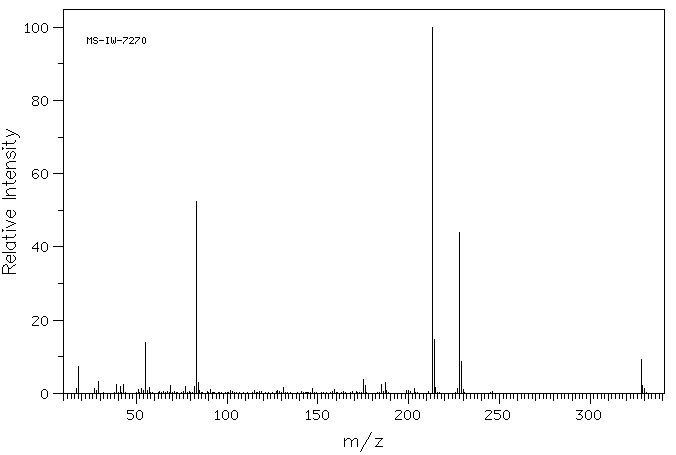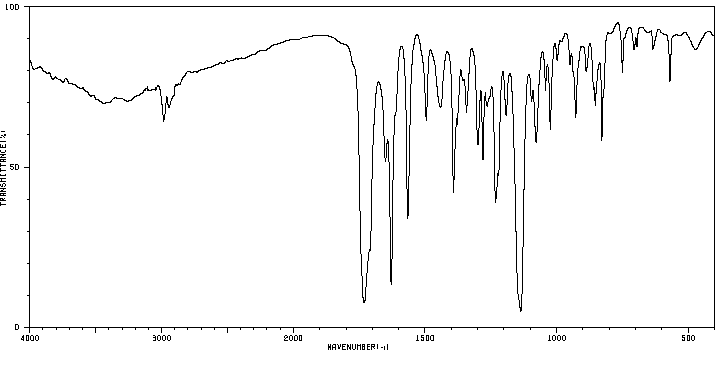紫花前胡素 | 5928-25-6
中文名称
紫花前胡素
中文别名
——
英文名称
decursin
英文别名
[(3S)-2,2-dimethyl-8-oxo-3,4-dihydropyrano[3,2-g]chromen-3-yl] 3-methylbut-2-enoate
CAS
5928-25-6
化学式
C19H20O5
mdl
——
分子量
328.365
InChiKey
CUKSFECWKQBVED-INIZCTEOSA-N
BEILSTEIN
——
EINECS
——
-
物化性质
-
计算性质
-
ADMET
-
安全信息
-
SDS
-
制备方法与用途
-
上下游信息
-
文献信息
-
表征谱图
-
同类化合物
-
相关功能分类
-
相关结构分类
物化性质
-
熔点:93-94℃
-
沸点:469.4±45.0 °C(Predicted)
-
密度:1.24
-
溶解度:DMSO:可溶,5mg/mL,澄清
计算性质
-
辛醇/水分配系数(LogP):3.9
-
重原子数:24
-
可旋转键数:3
-
环数:3.0
-
sp3杂化的碳原子比例:0.37
-
拓扑面积:61.8
-
氢给体数:0
-
氢受体数:5
安全信息
-
安全说明:S24/25
-
WGK Germany:3
-
海关编码:29322090
SDS
制备方法与用途
上下游信息
-
上游原料
中文名称 英文名称 CAS号 化学式 分子量 日本前胡醇 decursinol 23458-02-8 C14H14O4 246.263 —— 6-[(1R,2S)-1,2-epoxy-3-hydroxy-3-methylbutyl]-7-(methoxymethoxy)chromen-2-one 325137-96-0 C16H18O6 306.315 —— (-)-peucedanol 20126-72-1 C14H16O5 264.278 —— 6-[(1R,2S)-1,2-epoxy-3-oxobutyl]-7-(methoxymethoxy)chromen-2-one 325137-90-4 C15H14O6 290.273 —— 6-[(2S)-2,3-dihydroxy-3-methylbutyl]-7-(trifluoromethanesulfonyl)chromen-2-one 325137-98-2 C15H15F3O7S 396.341 —— 6-[(2S)-3-hydroxy-3-methyl-2-(triethylsilyloxy)butyl]-7-(trifluoromethanesulfonyl)chromen-2-one 325138-00-9 C21H29F3O7SSi 510.604 -
下游产品
中文名称 英文名称 CAS号 化学式 分子量 —— (7S)-(+)-2-methylacrylic acid 8,8-dimethyl-2-oxo-6,7-dihydro-2H,8H-pyrano[3,2-g]chromen-7-yl ester —— C18H18O5 314.338 —— (7S)-(+)-3-phenyl-acrylic acid, 8,8-dimethyl-2-oxo-6,7-dihydro-2H,8Hpyrano[3,2-g]chromen-7-yl ester —— C23H20O5 376.409 日本前胡醇 decursinol 23458-02-8 C14H14O4 246.263
反应信息
-
作为反应物:参考文献:名称:Synthesis and in vitro Assay of New Triazole Linked Decursinol Derivatives Showing Inhibitory Activity against Cholinesterase for Alzheimer’s Disease Therapeutics摘要:为了开发阿尔茨海默病治疗药物,我们设计并合成了新的三唑类癸二醇衍生物,它们对胆碱酯酶[乙酰胆碱酯酶(AChE)和丁酰胆碱酯酶(BuChE)]具有强效抑制活性。由于抑制胆碱酯酶(ChE)仍被认为是治疗注意力缺失症患者最有效的靶点之一,因此人们合成了许多新型的胆碱酯酶抑制剂。为了寻找新型胆碱能药物,研究人员利用点击反应,将去甲熊果醇与其他具有生物活性的化合物(如硫辛酸、多酚等)合成了去甲熊果醇衍生物 11-17,并对其生物活性进行了评估。化合物 12(对 BuChE 的 IC50 = 5.89 ± 0.31 mM)比加兰他敏(IC50 = 9.4 ± 2.5 mM)对 BuChE 具有更有效的抑制活性。Decursinol衍生物被认为是一种新的BuChE抑制剂,可作为治疗AD患者的新型候选药物。DOI:10.5012/jkcs.2016.60.2.125
-
作为产物:参考文献:名称:Enantioselective syntheses of decursinol angelate and decursin摘要:The practical enantioselective syntheses of decursinol angelate and decursin were achieved in eight steps from resorcinol. The stereochemistry was addressed using the catalytic asymmetric epoxidation of 7-acetoxy-2,2-dimethylchromene by chiral (salen)Mn complexes as the key step. (C) 2001 Elsevier Science Ltd. All rights reserved.DOI:10.1016/s0040-4039(01)00642-6
文献信息
-
Decursin Suppresses Human Androgen-Independent PC3 Prostate Cancer Cell Proliferation by Promoting the Degradation of β-Catenin作者:Gyu-Yong Song、Jee-Hyun Lee、Munju Cho、Byeoung-Soo Park、Dong-Eun Kim、Sangtaek OhDOI:10.1124/mol.107.040253日期:2007.12Alterations in the Wnt/β-catenin pathway are associated with the development and progression of human prostate cancer. Decursin, a pyranocoumarin isolated from the Korean Angelica gigas root, inhibits the growth of androgen-independent human prostate cancer cells, but little is known about its mechanism of action. Using a cell-based screen, we found that decursin attenuates the Wnt/β-catenin pathway. Decursin antagonized β-catenin response transcription (CRT), which was induced with Wnt3a-conditioned medium and LiCl, by promoting the degradation of β-catenin. Furthermore, decursin suppressed the expression of cyclin D1 and c- myc , which are downstream target genes of β-catenin and thus inhibited the growth of PC3 prostate cancer cells. In contrast, decursinol, in which the (CH3)2–C=CH–COO–side chain of decursin is replaced with–OH, had no effect on CRT, the level of intracellular β-catenin, or PC3 cell proliferation. Our findings suggest that decursin exerts its anticancer activity in prostate cancer cells via inhibition of the Wnt/β-catenin pathway.Wnt/β-catenin信号通路的改变与人类前列腺癌的发生和发展有关。Decursin是从韩国大独活根中分离出来的一种吡喃香豆素,能抑制雄激素非依赖性人前列腺癌细胞的生长,但其作用机制知之甚少。我们通过细胞筛选发现Decursin能减弱Wnt/β-catenin信号通路活性。Decursin通过促进β-catenin的降解,抑制了由Wnt3a条件培养基和氯化锂诱导的β-catenin反应转录因子。此外,Decursin还抑制了β-catenin下游靶基因如Cyclin D1和c-myc的表达,从而抑制了PC3前列腺癌细胞的生长。相反,Decursinol是Decursin中(CH3)2-C=CH-COO-侧链被-OH取代后的产物,对β-catenin反应转录因子、细胞内β-catenin水平或PC3细胞增殖均无影响。我们的研究结果表明Decursin通过抑制Wnt/β-catenin信号通路在前列腺癌细胞中发挥其抗癌活性。
-
一种吡喃香豆素类衍生物及其制备方法和用途申请人:吉林大学珠海学院公开号:CN112480141A公开(公告)日:2021-03-12本发明属于医药技术领域,涉及一种吡喃香豆素类衍生物及其制备方法和用途,所述吡喃香豆素类衍生物的结构通式为式Ⅰ所示的化合物其中,R为H、卤素、OH、NH2、COOH、C1‑C6烷基、C1‑C6烷氧基,C1‑C6烷基胺基,5‑10元杂环基,n取值为0‑6。所述吡喃香豆素类衍生物在制备用于预防和治疗前列腺癌的药物中的应用。本发明通过评价吡喃型香豆素中吡喃环3’位取代的紫花前胡醇酯化衍生物体外抑制人前列腺癌LNCaP细胞增殖活性,证明本发明所涉及的吡喃型香豆素中吡喃环3’位取代的紫花前胡醇酯化衍生物对人前列腺癌细胞的抑制作用,可作为预防和治疗前列腺癌潜在药物进行深度开发,在制备抗肿瘤药物领域,具有重要的实用价值和应用前景。
-
Enantioselective total syntheses of (+)-decursin and related natural compounds using catalytic asymmetric epoxidation of an enone作者:Tetsuhiro Nemoto、Takashi Ohshima、Masakatsu ShibasakiDOI:10.1016/s0040-4020(03)00861-5日期:2003.8The enantioselective total syntheses of (+)-decursin (1) and related natural dihydropyranocoumarins (−)-prantschimgin (3), (+)-decursinol (4), and (+)-marmesin (5) were achieved for the first time using catalytic asymmetric epoxidation of an enone as the key step. Catalytic asymmetric epoxidation of the enone was effectively promoted by the novel multifunctional asymmetric catalyst generated from La(O-i-Pr)3首次实现(+)-地精(1)和相关天然二氢吡喃香豆素(-)-花木素(3),(+)-地精醇(4)和(+)-marmesin(5)的对映选择性合成使用烯酮的催化不对称环氧化作为关键步骤。由La(O- i- Pr)3,BINOL和Ph 3 As generatedO以1:1:1的比例生成的新型多功能不对称催化剂可有效促进烯酮的催化不对称环氧化,以94%的收率得到环氧化物和96%ee,将其重结晶得到光学纯的环氧化物。转换为通用关键中间体(-)-二十二烷醇(7),所有天然的二氢吡喃香豆素都是通过钯催化的分子内C-O偶联反应合成的。基于X射线分析,激光解吸/电离飞行时间质谱,动力学研究和不对称扩增研究,还描述了烯类催化不对称环氧化的可能反应机理。
-
Enantioselective total syntheses of novel PKC activator (+)-decursin and its derivatives using catalytic asymmetric epoxidation of an enone作者:Tetsuhiro Nemoto、Takashi Ohshima、Masakatsu ShibasakiDOI:10.1016/s0040-4039(00)01702-0日期:2000.12The catalytic asymmetric total syntheses of (+)-decursin and three related natural products, (+)-decursinol, (−)-prantschimgin and (+)-marmesin, were achieved for the first time using catalytic asymmetric epoxidation of an enone as the key step. The catalytic asymmetric epoxidation of enone was found to be promoted effectively by novel multifunctional asymmetric catalyst generated from La(O-i-Pr)3
-
Discovery of Tricyclic Pyranochromenone as Novel Bruton’s Tyrosine Kinase Inhibitors with In Vivo Antirheumatic Activity作者:Hyewon Cho、Eun Lee、Hye Ah Kwon、Lee Seul、Hui-Jeon Jeon、Ji Hoon Yu、Jae-Ha Ryu、Raok JeonDOI:10.3390/ijms21217919日期:——Bruton’s tyrosine kinase (BTK) is an attractive target for treating patients with B cell malignancies and autoimmune diseases. Many BTK inhibitors have been identified; however, like other kinase inhibitors, they lack diversity in their core structures. Therefore, it is important to secure a novel scaffold that occupies the adenine-binding site of BTK. We screened an in-house library of natural productsBruton的酪氨酸激酶(BTK)是治疗B细胞恶性肿瘤和自身免疫性疾病患者的诱人靶标。已经鉴定出许多BTK抑制剂。但是,像其他激酶抑制剂一样,它们的核心结构缺乏多样性。因此,重要的是确保占据BTK的腺嘌呤结合位点的新型支架。我们通过生化分析筛选了一个天然产物及其类似物的内部文库,以鉴定出一种靶向BTK的新型支架。已发现衍生自天然活性成分decursin的吡喃色素酮支架可有效靶向BTK,并被选择用于进一步优化。通过在C7位修饰吡喃二酮合成了一系列吡喃二酮类似物。具有亲电子战斗部的吡喃二酮化合物显示出令人鼓舞的BTK抑制活性,IC50值在0.5–0.9 µM范围内。代表性化合物8的对接研究为化合物活性提供了合理的解释。化合物8表现出对其他相关激酶的良好选择性,并降低了THP细胞中促炎细胞因子的产生。此外,化合物8在胶原诱导的关节炎的鼠模型中表现出显着的体内功效。
表征谱图
-
氢谱1HNMR
-
质谱MS
-
碳谱13CNMR
-
红外IR
-
拉曼Raman
-
峰位数据
-
峰位匹配
-
表征信息
同类化合物
黄皮香豆精
黄木亭
黄曲霉素P2
黄曲霉素P1
黄曲霉素G2-13C17-同位素
黄曲霉素G2
黄曲霉素G1-13C17-同位素
黄曲霉素B2-13C17-同位素
黄曲霉素B1-13C17-同位素
黄曲霉素B1 8,9-环氧化物
黄曲霉素 G1
黄曲霉毒醇Ⅱ
黄曲霉毒醇M1
黄曲霉毒醇A
黄曲霉毒素M2
黄曲霉毒素M1-(O-羧甲基)肟
黄曲霉毒素G2a
黄曲霉毒素G19,10-环氧化物
黄曲霉毒素B2
黄曲霉毒素B1二氯化物
黄曲霉毒素B1-8,9-二氯化物
黄曲霉毒素B1-(O-羧甲基)肟
黄曲霉毒素 Q1
黄曲霉毒素 M1
黄曲霉毒素 B2
黄曲霉毒素 B1
黄曲霉毒素
香豆霉素
香豆素6H
香豆素545T
香豆素545
香豆素525
香豆素343甲酯
香豆素338
香豆素314T
香豆素175
香豆素152
香豆素106
香豆素-D4
香豆素-6-磺酰氯
香豆素-6-甲醛
香豆素-5-氧丁酸
香豆素-4-乙酸
香豆素-3腈
香豆素-35
香豆素-3-羧酸酸酐
香豆素-3-羧酸琥珀酰亚胺酯
香豆素-3-羧酸乙酯
香豆素-3-羧酸
香豆素-3-甲酰氯









